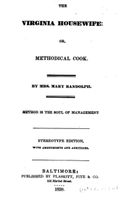Label
All
0
Clear all filters
Observations on Puddings and Cakes
Appears in
Published 1824
The salt should always be washed from butter, when it is to be used in any thing that has sugar for an ingredient, and also from that which is melted to grease any kind of mould for baking—otherwise, there will be a disagreeable salt taste on the outer side of the article baked. Raisins should be stoned and cut in two, and have some flour sifted over them—stir them gently in the flour, and take them out free from lumps; the small quantity that adheres to them, will prevent their sticking together, or falling in a mass to the bottom. Eggs must be fresh, or they will not heal well: it is better to separate the yelks from the whites always, though it is a more troublesome process; but for some things it is essential to do so: when they are to be mixed with milk, let it cool after boiling, or the eggs will poach; and only set it on the fire a few minutes, to take off the raw taste of the eggs, stirring it all the time. Currants require washing in many waters to cleanse them; they must be picked and well dried, or they will stick together. Almonds should be put in hot water till the skins will slip off, which is called blanching; they must always be pounded with rose or orange flower water, to prevent their oiling. When cream is used, put it in just before the mixture is ready; much beating will decompose it. Before a pudding or cake is begun, every ingredient necessary for it must be ready; when the process is retarded by neglecting to have them prepared, the article is injured. The oven must be in a proper state, and the paste in the dishes or moulds, ready for such things as require it. Promptitude is necessary in all our actions, but never more so than when engaged in making cakes and puddings. When only one or two eggs are to be used, cooks generally think it needless to beat them—it is an error: eggs injure every thing, unless they are made light before they are used. Cloths for boiling puddings should be made of German sheeting; an article less thick, will admit the water, and injure the pudding.
Part of
Advertisement
Related Recipes
-
-
-
-
Related Reference
-
-
-
-
Advertisement
The licensor does not allow printing of this title



